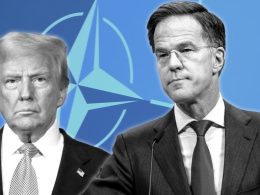The New York Post summarised it best. The tabloid’s Wednesday front page showed Donald Trump pointing at a map of the western hemisphere with Canada as the “51st state”, the Gulf of Mexico renamed “Gulf of America”, the Panama Canal reborn as “Pana-Maga” and Greenland as “Our Land”. Its headline was “The Donroe Doctrine”, a play on the 1823 Monroe Doctrine when the US declared the hemisphere off-limits to European meddling. To my knowledge, Trump has never referenced America’s fifth president, James Monroe. But in refusing to rule out military action to grab whatever nearby real estate takes his fancy, Trump is giving strange rebirth to the doctrine.
This time it is the exclusion of China, rather than Europe, that provides the rationale. By contrast, Trump often references William McKinley, America’s 25th president, whose 1890 tariff law (that McKinley introduced as a congressman) he greatly admires. But it was McKinley’s later actions as president that are more relevant to this note. In 1898 he seized the remnants of a collapsing Spanish empire, including Puerto Rico, Cuba and the Philippines. His successor, Teddy Roosevelt, made his name leading the “Rough Riders” volunteer unit in the Cuban leg of the Spanish-American War. McKinley and Roosevelt embody the overtly imperialist chapter of US history.
Should we take Trump’s threats of territorial expropriation literally? I very much doubt Trump would go to war with Denmark, a Nato ally, or flood the Panama Canal with US paratroopers. But it is not out of the question. America invaded Panama in 1989 to remove, then jail, its strongman General Manuel Noriega. Twenty-three American and 314 Panamanian soldiers lost their lives in that little war.
A likelier outcome is that an intimidated Panama offers Trump preferential rates for US shipping to get him off its back. Denmark, meanwhile, might give US companies favourable critical mineral and fossil fuel exploration rights to its part of the melting Arctic. There is almost always a money play behind Trump’s bluster. My guess is that Trump is jesting when he threatens to take over Canada, a far less digestible piece of real estate. But seriously, who knows? We seem to be living in an actual science fiction novel.
History has a funny way of casting new light on events. The fact that America’s 39th president, Jimmy Carter, passed away a few days before Trump revived US sovereignty claims over Panama is an ironic twist. Carter gambled his presidency on returning the canal to Panamanian sovereignty to undo what he saw as Teddy Roosevelt’s immoral theft of the land. In addition to his ethical impulse, Carter’s move was also tactical; his aim was to consign the Monroe Doctrine to history as he was trying to undercut the Soviet Union’s equivalent assertion of its own sphere of interest in central and eastern Europe. Carter was a man of his word. Trump is not.
The rule of thumb for Trump’s approach to foreign policy is simple. He believes the world is a jungle in which the larger predators eat the smaller. He has great respect for other large beasts, namely China and Russia, and a sense of carte blanche towards the smaller ones. There is an upside as well as a downside to the Trump doctrine. The advantage is that his operating manual is very simple to decode. Trump’s transactionalism is transparent. The drawback is that he has no ethical limits.
The stock market or — less probably — the US Congress might dissuade him from seizing another country, but he would suffer no compunction. Along with countless others, I have often decried the hypocrisies of Washington’s “liberal international order”. We will miss those hypocrisies when they are gone.
I am turning this week to Richard Porter, former senior partner at Kirkland & Ellis and former executive committee member of the Republican National Committee. Though we disagree on a lot, Richard is a good friend. Richard, do you worry that Trump’s transactional approach is self-defeating? Why would any nation do a deal with a man who would tear it up if he saw fresh advantage?
What will Trump’s second term mean for America and the world? FT subscribers can join our webinar on January 23 at 8am ET/1pm GMT to put questions to our journalists.
Recommended reading
-
My column this week looks at Elon Musk’s war on America’s allies. “America didn’t elect Elon Musk,” I write. “Yet he is acting as Donald Trump’s de facto co-president. Musk’s self-appointed remit includes gunning for regime change in allied democracies . . . His silence on Russia and China speaks even louder.” Here, also, is my take on America’s farewell to Jimmy Carter in the National Cathedral on Thursday.
-
My colleague Martin Wolf offered this heartfelt and intellectually unarguable appraisal of the recently-departed Manmohan Singh, the architect of India’s economic turnaround in the 1990s, and Narendra Modi’s predecessor as prime minister. Having known Manmohan a little myself, I would double underline what Martin wrote about his modesty and courtesy. He was a brilliant man who was in the right place for India at the right time. Just as striking and valuable was the decency of his character.
-
I would strongly recommend this Catherine Rampell piece in the Washington Post on the legacy of Bidenomics, which is “maybe not that much at all”. Rampell offers a bracing and convincing rejoinder to some of the overblown eulogies Bidenomics has been receiving.
-
Finally, I’d strongly recommend Henry Farrell’s Substack, Programmable Mutter, on the impact of technology on politics, especially his note on why Silicon Valley turned right and again here on PKD dystopia. PKD stands for Philip K Dick, the science fiction novelist. Farrell convinced me to read Dick’s Do Androids Dream of Electric Sheep? which was the inspiration for Blade Runner. I wish I could describe it as escapism.
Richard Porter replies
Self-defeating? To the contrary, Trump is advancing American interests even before being sworn in; consider that he has caused Mexico to stem the flow of immigration, corporate America to ditch DEI, banks to ditch the Net-Zero Banking Alliance and Facebook to stop censoring speech.
Boom! America is back, baby! And if you love America and free enterprise, he’s a blast of fresh air.
All human affairs are transactional. What’s different about Trump is not that he transacts, but his approach to transactions.
First, Trump is perpetually, instinctively and forthrightly alpha, using every psychological strategy in our primate playbook to set the terms to our national advantage. He uses his imposing physical size, his hand shake, strong language, facial expressions, threats (or are they bluffs?) and other strategies to create uncertainty, throw counterparties off balance — and change everyone else’s calculus about the terms on which a transaction should occur.
Second, Trump is perpetually optimistic, comfortable taking calculated risks, and thinks outside the box. He instinctively seeks to create, expand, acquire, build, and he shrewdly looks for ways to change the odds of success in order to achieve improbable success.
Third, he’s unabashedly American. He’s unashamed of our history, unimpressed by lesser nations and unafraid to assert our interests.
To paraphrase Roosevelt, America has a big stick — and Trump is not one to speak softly. America has been a self-effacing giant, picking up the tab for our friends in Nato, and trying to curry favour with adversaries by offering them cash (Iran) and favourable trade and regulatory terms (China and the G7).
Other countries deal with us because we offer a market their industries have to access, capital their industries need to grow, protection against evil and the opportunity to be great with us once again. America is the essential nation; we don’t need to suck up to make the world better, we can stand up, demand others do too, and get the best deal possible for ourselves in the process.
Your feedback
And now a word from our Swampians . . .
In response to “The battle for working people”:
“In this new world where so much has been automated there is no longer a hands-on path from education to productivity. As automation replaced workers, knowledgeable individuals were retained to do the necessary exception processing but no training was set up for the next generation; the manual work that used to train people is gone. We are in a critical period of time when my generation (boomers) are ready to retire but no one around us wants our job! Failing to work with the next generation in the US is why we are looking abroad.” — Sara E Davis
“The argument that H-1B visas are about wage savings is false. This is almost entirely about the need for high-level engineering and related talent that is in short supply among the American populace. To be clear: This is not about quantity but instead is about quality. The arguments on the left against this are just more of their implicit anti-capitalist stance while the argument on the part of some on the right come from a lack of understanding of how the modern world works. This is worrisome enough in and of itself but what is more troubling is that there are concentrations of those on the left and right who are entirely too much in agreement for an acceptance of mediocrity.” — Henry D Wolfe
Your feedback
We’d love to hear from you. You can email the team on swampnotes@ft.com, contact Ed on edward.luce@ft.com, and follow him on X at @EdwardGLuce. We may feature an excerpt of your response in the next newsletter
Source link









